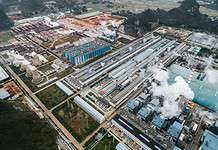RIO Tinto (ASX: RIO) has entered into a historic MoU with Chinese steel giant China Baowu Steel Group and Tsinghua University to implement methods that reduce carbon emissions across the steel value chain.
Signed at the China International Steel and Raw Materials Conference in Qingdao, the MoU will enable the formation of a working group tasked with identifying a pathway to reduce the carbon emitted across the entire value chain – amounting to between 7-9pc of world emissions.
This comes as a major breakthrough to address carbon emission downstream, or scope 3 emissions, as mounting concerns pressure companies such as BHP to address the global climate impact of their products across the whole supply chain.
Rio Tinto chief executive Jean-Sébastien Jacques said it was a pioneering partnership that would address the steel industry’s carbon footprint across the entire value chain.
“The materials we produce have an important role to play in the transition to a low carbon future and we are committed to partnering with our customers and others to find the most sustainable ways to produce, process and market them,” he said.
State-owned China Baowu is China’s largest steel producer, and chair Chen Derong said that the company was committed to a cleaner future across the value chain.
“We want to make a difference to the iron and steel ecosystem by developing greener factories and enterprises to deliver a cleaner, more sustainable steel industry,” he said.
“China Baowu looks forward to exploring low-carbon metallurgical innovation with Rio Tinto and Tsinghua University, and building a low-carbon industrial value chain.”
Tsinghua University vice president You Zheng said that the MoU would enable the university to work with the upstream and downstream of the steel industry to find the solution to its low carbon future.
The establishment of a working group between the three parties will develop an action plan that best utilises each member’s strengths in research and development, technologies, processes, equipment, logistics, industry coordination and policy advisory.







































